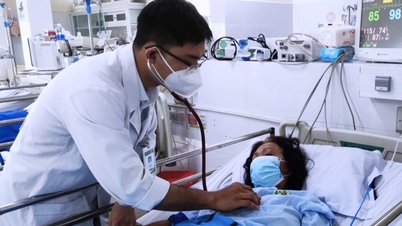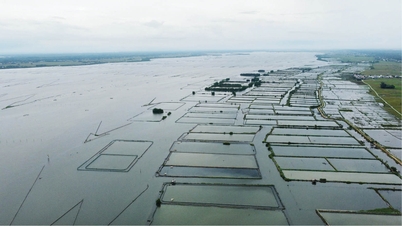Relatives said the patient was hit by high voltage electricity, struggling and having severe burns on his hands and feet. 115 emergency doctors arrived at the scene, set up an IV line and transferred the patient to the emergency room.
On July 20, doctors at Hung Vuong General Hospital said the patient suffered serious burns due to electric shock. The team injected painkillers, anti-shock drugs, antibiotics and bandaged the burn. Currently, the patient's health is stable, but the burn sequelae require long-term monitoring.
Patients with electrical burns have a high rate of disability, long hospital stays, and often leave ugly scars due to multiple surgeries, and are at risk of necrosis, infection, and poisoning. Electric shock accidents mainly occur with construction workers, people working near power lines, hanging billboards, roofing, installing antennas, or even fishing. In the rainy season, the humidity increases, and the possibility of electric discharge and electric shock is also higher.
In the summer, there are frequent thunderstorms, people need to be very careful when working and moving in areas with electricity grids, especially places with power stations and high voltage lines. Do not leave electrical equipment in the house near water sources. Do not touch electrical equipment when your hands are wet. If an electrical device falls into a water source, turn off the power before removing it.
Do not allow electrical conductors to come into contact with the power source. Use only wooden objects such as sticks or branches for safety.
When rescuing someone who has been electrocuted, do not touch the victim directly, but try to disconnect the power source as quickly as possible. If an electric shock accident occurs at home, use a dry wooden stick, such as a broom handle, or a chair leg covered with insulating plastic to separate the victim and call for emergency help.
Minh An
Source link





![[Photo] Binh Trieu 1 Bridge has been completed, raised by 1.1m, and will open to traffic at the end of November.](https://vphoto.vietnam.vn/thumb/1200x675/vietnam/resource/IMAGE/2025/10/2/a6549e2a3b5848a1ba76a1ded6141fae)








![[Photo] The 1st Congress of Phu Tho Provincial Party Committee, term 2025-2030](https://vphoto.vietnam.vn/thumb/402x226/vietnam/resource/IMAGE/2025/9/30/1507da06216649bba8a1ce6251816820)





![[Video] Ministry of Health issues document to rectify medical examination and treatment work](https://vphoto.vietnam.vn/thumb/402x226/vietnam/resource/IMAGE/2025/10/2/54913f30a9934e18bcbb246c2c85f11d)



















































































Comment (0)